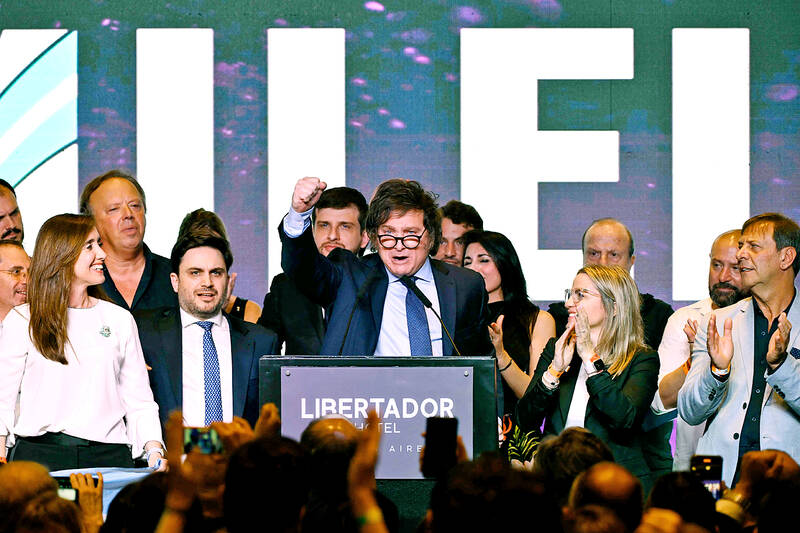Argentine Minister of Economy Sergio Massa and anti-establishment outsider Javier Milei are to face off in a runoff presidential poll, a battle between two wildly different versions of the country, election results showed on Sunday.
Latin America’s third-largest economy is creaking under triple-digit inflation after decades of recurrent fiscal crises marked by debt, financial mismanagement and a volatile currency.
The charismatic Massa, representing the ruling center-left Peronist coalition, overcame expectations to come first with 36.6 percent of votes, with more than 97 percent of ballots counted, despite overseeing record annual inflation and poverty levels.

Photo: EPA-EFE
“Our country is in a complicated situation ... nevertheless you believed we were the best tool to build a new step in Argentina’s history,” Massa told his cheering supporters in Buenos Aires.
If elected, Massa promised to lead a government of national unity, a first for Argentina, and launched an appeal to “all those who share our democratic values.”
“I am not going to fail you,” he said.

Photo: AFP
The libertarian Milei, leader of the La Libertad Avanza party, who brought a powered-up chainsaw to rallies vowing to slash public spending and dollarize the economy, scored 30 percent of the vote.
The rock-singing, TikTok-savvy outsider came from nowhere to put up a fierce challenge to traditional political parties, touching a nerve with Argentines fed-up with economic shambles.
“Today is a historic day because two-thirds voted for change. All of us who want change have to work together. We can win, take back our country, prevent our kids from leaving the country,” Milei said.
The two will compete in a Nov. 19 runoff election, with the winner to take office on Dec.10.
In his victory speech Massa sought to present himself as the calmer, steadier hand, as opposed to Milei, who surged to prominence with his angry diatribes against the “thieving and useless political class” and dire state of the country’s economy.
“I am convinced that this is not a shit country. It is a great country and we are going to give it the place that it deserves,” Massa said.
During the campaign, Massa took pains to highlight what his opposition’s plans to cut hefty electricity and public transport subsidies would mean for people’s pockets.
To woo voters, he went on a pre-election spending spree, slashing income tax for much of the population in a move analysts said would only make the country’s fragile financial situation worse.
Milei, a libertarian economist, blindsided pollsters when he surged to the front of the election race, winning an August primary with 30 percent of votes.
He kept the same amount of votes in the first-round election.
While some are keen for a radical shift, “a lot of Argentines have a lot to lose from the dismantling of the social welfare state,” which supports millions, said Benjamin Gedan, director of the Argentina Project at the Washington-based Wilson Center.
“If Milei is at rallies wielding a chainsaw, well, at the other end of that chainsaw is people’s quality of life,” Gedan said.
With more than 8 million votes up for grabs that went to third-placed former Argentine minister of security Patricia Bullrich and two other candidates, he said Massa faces a stiff battle against the upstart Milei.
“I think a simple reading of this first-round result is that many more Argentines want to throw Peronists out of power than the number who would like to see them remain,” Gedan said.

The Burmese junta has said that detained former leader Aung San Suu Kyi is “in good health,” a day after her son said he has received little information about the 80-year-old’s condition and fears she could die without him knowing. In an interview in Tokyo earlier this week, Kim Aris said he had not heard from his mother in years and believes she is being held incommunicado in the capital, Naypyidaw. Aung San Suu Kyi, a Nobel Peace Prize laureate, was detained after a 2021 military coup that ousted her elected civilian government and sparked a civil war. She is serving a

‘NO AMNESTY’: Tens of thousands of people joined the rally against a bill that would slash the former president’s prison term; President Lula has said he would veto the bill Tens of thousands of Brazilians on Sunday demonstrated against a bill that advanced in Congress this week that would reduce the time former president Jair Bolsonaro spends behind bars following his sentence of more than 27 years for attempting a coup. Protests took place in the capital, Brasilia, and in other major cities across the nation, including Sao Paulo, Florianopolis, Salvador and Recife. On Copacabana’s boardwalk in Rio de Janeiro, crowds composed of left-wing voters chanted “No amnesty” and “Out with Hugo Motta,” a reference to the speaker of the lower house, which approved the bill on Wednesday last week. It is

‘EAST SHIELD’: State-run Belma said it would produce up to 6 million mines to lay along Poland’s 800km eastern border, and sell excess to nations bordering Russia and Belarus Poland has decided to start producing anti-personnel mines for the first time since the Cold War, and plans to deploy them along its eastern border and might export them to Ukraine, the deputy defense minister said. Joining a broader regional shift that has seen almost all European countries bordering Russia, with the exception of Norway, announce plans to quit the global treaty banning such weapons, Poland wants to use anti-personnel mines to beef up its borders with Belarus and Russia. “We are interested in large quantities as soon as possible,” Deputy Minister of National Defense Pawel Zalewski said. The mines would be part

Cozy knits, sparkly bobbles and Santa hats were all the canine rage on Sunday, as hundreds of sausage dogs and their owners converged on central London for an annual parade and get-together. The dachshunds’ gathering in London’s Hyde Park came after a previous “Sausage Walk” planned for Halloween had to be postponed, because it had become so popular organizers needed to apply for an events licence. “It was going to be too much fun so they canceled it,” laughed Nicky Bailey, the owner of three sausage dogs: Una and her two 19-week-old puppies Ember and Finnegan, wearing matching red coats and silver